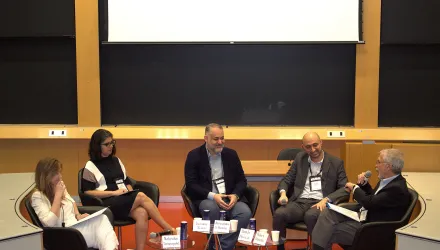India's Misguided Message: Nuclear tests undermine status, underscore need for treaty
Jennifer Weeks
India's stunning decision to conduct five nuclear tests last week has dealt a serious blow to international arms control. But ending nuclear testing still makes sense. Shelving the Comprehensive Text Ban Treaty in response to the underground tests, as some US Senate leaders have recommended, is exactly the wrong reaction.
Instead, the United States should work with other countries to ensure these tests are the last the world will see, and to make clear that embracing nuclear weapons will not bring India the prestige and international clout it seeks.
Officials in New Delhi see the tests not only as a huge technical achievement, but also as proof that India cannot be coerced into giving up a technology it believes is essential to its security. Indian accounts have suggested that the tests will strengthen the case for giving the world's largest democracy a permanent seat on an expanded United Nations Security Council, and will ensure India a leading role in disarmament negotiations.
The world reaction shows just how misguided this perspective is. From Sweden to Australia to Japan, governments have condemned India's action in the strongest terms. A number have frozen their aid programs. Some that have important commercial ties with India, such as Russia, have soft-pedaled their objections. No country has reacted positively.
This uniform response reflects broad international support for ending nuclear testing. Since 1996, when the comprehensive Test Ban Treaty was completed, 149 nations have signed it, and 13 have ratified it. India refused to sign because the treaty did not require the declared nuclear weapons states to commit to a time-bound framework for abolishing their own nuclear weapons. In addition, India argued, those states would still be able to maintain arsenals using their laboratory capabilities.
But India was unable to persuade other countries that these arguments justified rejecting a test ban, a ban that India first proposed in the 1950s. India is even less likely to be viewed now as a credible leader on disarmament issues, especially since the Hindu-nationalist BJP government has called for integrating nuclear weapons into India's defenses, and since the tests may provoke matching actions by neighboring Pakistan.
Indian leaders assert that they are true supporters of nuclear disarmament, and that the United States is hypocritical for urging India not to go nuclear when it possess thousands of such weapons. India is right on the broad point that much more needs to be done to reduce nuclear arms worldwide, but accelerating a regional arms race is not the way to make this happen.
In fact, by expanding its nuclear program, India is moving in the opposite direction from other countries. Many developed and developing nations want to see more progress on disarmament by the nuclear powers, but they also believe that further proliferation is not in their interest.
This was made clear in 1995, when more than 170 countries agreed at a special international conference to make the Nuclear Non-Proliferation Treaty permanent. India opposed this decision. Today, India is one of only five countries worldwide that have not signed the treaty. (The others are Israel, Pakistan, Cuba, and Brazil, which has forsworn nuclear weapons under a separate regional agreement).
At the 1995 conference, the nations endorsed a set of principles and objectives for further progress on nonproliferation and disarmament. This list included some measures that India opposes, including universal adherence to the Nuclear Non-Proliferation Treaty and a call for limiting nuclear commerce to countries that accept international safeguards on all their nuclear facilities. (India does not.) Several nonaligned countries criticized the proliferation threat posed by India's and Pakistan's nuclear weapons programs.
In sum, most nations that favor further reductions in nuclear weapons believe that treaty agreements, imperfect though they may be, are the best way to get there. While India has not broken any international commitments by testing nuclear weapons (since it believes that both of these treaties "have no relevance," as one Indian defense analyst said), it has effectively stuck its thumb in the eye of world opinion.
President Clinton has taken the right course by ordering sanctions on India, as required by US law, and calling on Pakistan to refrain from carrying out a nuclear test in response. But the United States can do more in order to contain the damage from India's action, including:
- Calling on Russia and China to curb their respective special relationships with India and Pakistan. Russia is negotiating to sell nuclear power plants to India, and has reportedly provided technology to India's missile program. China has a long history of supporting Pakistan's nuclear weapons and missile programs, a relationship that India cited to justify its decision to hold last week's tests. The United States should press Russia and China to curb these ties and use their influence for restraint in South Asia.
- Resisting Indian offers of selective disarmament concessions. Now that it has completed its planned test series, the Indian government has said that it is ready to consider adhering to "some of" the commitments of the Comprehensive Test Ban Treaty, assuming that other countries make concessions as well. But the CTBT is not an a la carte menu from which countries can pick and choose. If India is serious about ending nuclear testing, it should sign the treaty as it stands.
- Ratifying the comprehensive treaty. It would be a huge mistake for the Senate to give up on ratification, let alone for the United States to resume testing, as some hard-liners in Washington have suggested. The United States does not need to conduct more nuclear tests to defend its interests against India, or any other country. Ending nuclear testing would make it much more technically difficult for countries with clandestine weapons programs, such as Iraq, to develop advanced nuclear warheads. And the comprehensive treaty provides an international standard for isolating countries such as India that choose to test.
India was already expected to block the comprehensive treaty from taking effect. (As written, it is one of a group of countries that must ratify the treaty before it becomes binding). But the treaty calls for a special international conference, expected to occur in September 1999, to find alternate routes if some of these countries have not joined by that date. There is an important catch: if the United States has not ratified the comprehensive treaty by then, it cannot participate.
It would be cruelly ironic if India, which has long supported a test ban, derails the treaty now. With India's action perhaps triggering further nuclear tests, solidifying the international consensus against testing is even more in the United States' interest. Bringing the Comprehensive Test Ban Treaty into force as quickly as possible is the most effective way to show India -- and Pakistan, if it tests nuclear devices as well -- that going nuclear is a dead end, not a route to disarmament.
Weeks, Jennifer. “India's Misguided Message: Nuclear tests undermine status, underscore need for treaty.” The Boston Globe, May 17, 1998





